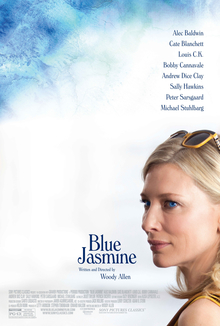 I recently saw the new Woody Allen film, Blue Jasmine. It stars Cate Blanchett and Alec Baldwin as a couple who live the high life and then the low life following divorce. The story line and themes in this movie seemed true to me based on my work with many divorcing couples, not just those who are wealthy.
There were the underlying issues in the marriage–the husband’s cheating, both with sexual affairs and financial fraud, and the wife’s complicity through passivity and claimed ignorance (although she knows more than appears). There was denial by both of the problems, which included mental health and drinking issues. For the wife in this movie, her loss of self and identity following the separation and divorce was shattering and, in the end, her emotional choice to revenge resulted in enormous cost and loss to both of them.
I am not saying that all divorces follow all of these themes in this movie. Like an opera, the movie highlights some dramatic truths about human nature and patterns in relationships.
One pattern is that problems during the marriage which have not been addressed can pop up and control the divorce process, sabotaging efforts to reach a settlement. This doesn’t mean that a couple has to “fix” all the troubles leading up to the divorce, but could require acknowledgement of the problems and work toward a future that addresses the realities of their situation. So, for the couple in Blue Jasmine, it would be addressing the mental health needs and possible alcoholism treatment for one or both, college education for wife, and a top notch criminal defense attorney for husband.
The instinct for revenge, which often causes hurt to both in the divorce, can be defused in a collaborative divorce process which focuses on the collective outcome for the family as a whole. In Blue Jasmine, that would include the outcome for their son, who was hurt by the divorce, and for the parents.
I recently saw the new Woody Allen film, Blue Jasmine. It stars Cate Blanchett and Alec Baldwin as a couple who live the high life and then the low life following divorce. The story line and themes in this movie seemed true to me based on my work with many divorcing couples, not just those who are wealthy.
There were the underlying issues in the marriage–the husband’s cheating, both with sexual affairs and financial fraud, and the wife’s complicity through passivity and claimed ignorance (although she knows more than appears). There was denial by both of the problems, which included mental health and drinking issues. For the wife in this movie, her loss of self and identity following the separation and divorce was shattering and, in the end, her emotional choice to revenge resulted in enormous cost and loss to both of them.
I am not saying that all divorces follow all of these themes in this movie. Like an opera, the movie highlights some dramatic truths about human nature and patterns in relationships.
One pattern is that problems during the marriage which have not been addressed can pop up and control the divorce process, sabotaging efforts to reach a settlement. This doesn’t mean that a couple has to “fix” all the troubles leading up to the divorce, but could require acknowledgement of the problems and work toward a future that addresses the realities of their situation. So, for the couple in Blue Jasmine, it would be addressing the mental health needs and possible alcoholism treatment for one or both, college education for wife, and a top notch criminal defense attorney for husband.
The instinct for revenge, which often causes hurt to both in the divorce, can be defused in a collaborative divorce process which focuses on the collective outcome for the family as a whole. In Blue Jasmine, that would include the outcome for their son, who was hurt by the divorce, and for the parents.
Two Paths, One Decision: The Divorce Dilemma
Emily and Daniel were in love. Their love story had once been the envy of the neighborhood—a whirlwind romance that blossomed into a marriage filled with laughter, shared dreams, and whispered secrets. But as the years went by, cracks appeared in their fairy tale....



